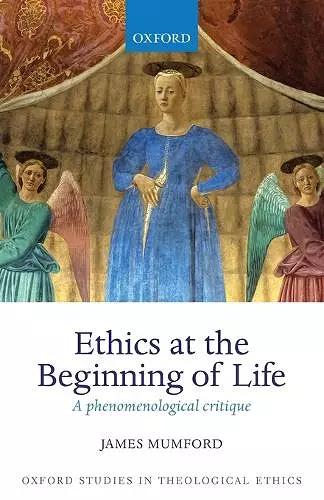Ethics at the Beginning of Life
A phenomenological critique
Format:Paperback
Publisher:Oxford University Press
Published:25th Jun '15
Currently unavailable, and unfortunately no date known when it will be back
This paperback is available in another edition too:
- Hardback£140.00(9780199673964)

Many of the most controversial moral decisions we face hinge upon competing descriptions of life, and never is this truer than at the beginning of life. James Mumford draws upon phenomenology (a branch of continental philosophy) to question the descriptive adequacy, the essential 'purchase upon reality', of many of the approaches, attitudes and arguments which make up beginning of life ethics today. He argues that many of the most prevalent positions and practices in our late modern culture have simply failed to take into account the reality of human emergence, the particular way that new members of our species first appear in the world. Historically, phenomenologists have been far more interested in death than in birth. Mumford therefore first develops his own phenomenological investigation of human emergence, taking leads and developing approaches from phenomenologists both French and German, both living and dead. In the second half of the book phenomenology is finally applied to ethics, and acute moral questions are divided into two kinds: first those concerning 'what' it is that we are dealing; and, secondly, the more contextual 'where' questions relating to the situation in which the subject is found. Finally, although this book primarily constitutes a philosophical rather than a religious critique of contemporary ethics, with the findings from continental philosophy being brought to bear upon core convictions of English-speaking 'liberal' moral and political philosophers, Mumford concludes by exploring an alternative theological basis for human rights which might fill the vacuum created.
Unusually perceptive and helpful. To read his argument with care is to have ones judgment sharpened and illumined ... This is a work of serious philosophical argument, well worth our taking seriously * Gilbert Meilaender, The New Atlantis *
[A] highly sophisticated book * Orion Edgar, Church Times *
James Mumfords Ethics at the Beginning of Life: A phenomenological critique (Oxford, 2013) is a remarkable piece of work. It is a phenomenological study of the ethical import of how we come into the world. It is phenomenological because it attends fixedly to the phenomena. By staring hard at the phenomenon of pregnancy, the realities of newones and newborns, Mumford concludes that we dont come into the world full-grown like Adam or Cadmus, but in radically particular, dependent, asymmetrical relationship. * Peter J. Leithart, First Things *
This book says something genuinely new, and provides a welcome intervention within the context of over-determined and intractable debates about the beginning of live. It deserves to be read carefully by anyone with interests in theological ethics, phenomenology, continental philosophy and human life. * Michael Mawson, Studies in Christian Ethics *
A deeply sophisticated argument about the character of our relation with unborn and newborn human beings. It challenges the models that have been allowed uncritical domination in a lot of recent ethical argument; and, without emotive pleading or overheated polemic, it insists that we look afresh at assumptions around abortion and the status of the unborn person, on the grounds of solid philosophical discussion as well as offering a rich and resourceful theological context for such a new look at the issues. This is a seriously impressive work. * Rowan Williams *
Skilful and original, a creative description of what Mumford calls the 'extraordinary encounter' of the 'newone'. This is a contribution both to moral philosophy and to phenomenology, a rare achievement. Mumford is a scholar equally at ease in the British and Continental tradition, he opens his readers eyes to many a fact which his predecessors have left unnoticed. The book is also the work of a good stylistreading -- it is sheer pleasure. * Jean Yves Lacoste *
Finally a book that offers a way to think about abortion that is an alternative to the language of past and present discussions. Drawing on the work of Merleau-Ponty, Mumford makes it possible for us to see how a mother's experience of her child is crucial for the recognition of our joint humanity. This is a brilliant book that has implications for how we think about a wide range of questions concerning our relation to one another. * Stanley Hauerwas *
Mumford's book is not only a very interesting contribution to the debate on the ethics of the beginning of life, but it is also an excellent example of scholarship on Continental philosophy. * Paolo Monti *
[Mumford] offers fresh arguments about how we relate to unborn and new-born human beings, challenging accepted ethical arguments and insisting that we look afresh at the assumptions we have made about abortion and the status of the unborn person. * Patrick Comerford, Search *
ISBN: 9780198745051
Dimensions: 217mm x 140mm x 13mm
Weight: 290g
228 pages